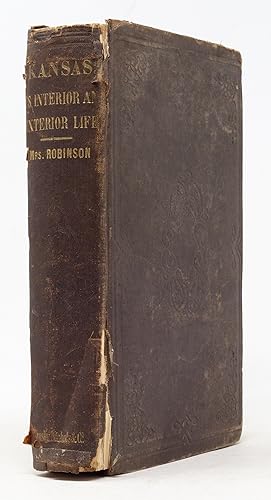About this Item
8vo., (7 4/8 x 4 6/8 inches). Engraved frontispiece portrait and one other plate (browned and with a few pale stains throughout). Original brown cloth gilt (worn with loss at the head and foot of the spine and hinges, rubbed). Provenance: with the near contemporary ownership inscription of Arthur D. Bryant of Washington D.C. on the front free endpaper; modern ownership inscription on the front paste-down. Fourth edition. Sara Robinson was the loyal wife of the first Governor of Kansas Charles Lawrence Robinson (1818-1894), and this is her account of the state of Kansas written during a her three-month stay in the United States Camp at Lecompton, where her husband was being held prisoner. Robinson had emigrated to Kansas Territory in 1854 and had written a pamphlet for prospective settlers as a general agent for New England Emigrant Aid Company. "Robinson became a key figure during the violence known as "Bleeding Kansas." Leader of a free-soil faction that considered blacks as potential equals, he opposed accepting the results of the fraudulent election of a proslavery legislature.When violence flared in the so-called Wakarusa War between proslavery and free-state elements, Robinson took a hand in avoiding bloodshed that enhanced his reputation among moderate free-state groups. Early in 1856, in a contest against Lane, he was elected governor under the Topeka constitution adopted by free-state voters. He now headed a rump government that became the storm center of presidential politics in 1856. "During the crucial years 1856-1857, Robinson played the roles of both sacrificial lamb and moderate. Early in 1856 President Franklin Pierce denounced the Topeka government and offered federal troops to maintain public order. To this Robinson, in his inaugural address, responded with a defense of republican principles and squatter sovereignty. A grand jury, instructed by an anti-free-state federal judge, indicted Robinson and others for treason. Robinson was arrested and detained for four months. During this period Kansas was the scene of the notorious events that helped shape the newly formed national Republican party: the "sack of Lawrence" and John Brown's (1800-1859) "Pottawatomie massacre." The Republican party platform, denouncing violence and fraudulent voting in Kansas, demanded immediate admission as a state under the Topeka constitution. "In 1857, when an election for territorial legislature impended, Robinson abjured force and nonparticipation and in October took satisfaction in a free-state victory. His leadership--entailing courage and peaceful participation in politics--had done much to dampen the prospect of Kansas becoming a slave state. "The Free State party in Kansas yielded to the Republican party and the Topeka constitution to the freshly drafted Wyandotte constitution. In 1861, with the admission of Kansas, Robinson became the state's first governor" (James A. Rawley for ANB). Herd 1921. Plains & Rockies IV:279b:6 (new entry in revised Wagner-Camp). Rader 2804. Catalogued by Kate Hunter. Seller Inventory # 000222
Contact seller
Report this item
![]()



